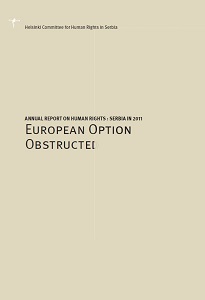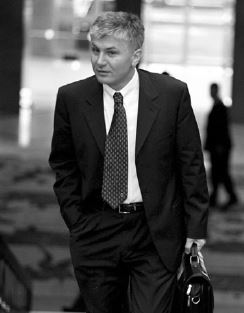

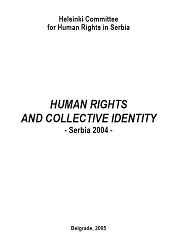
Keywords: identity – individual and collective; serbian orthodox church; kosovo; serbian nationalism;human right in Serbia;
More...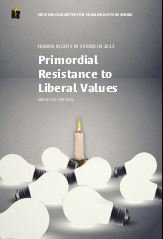
Keywords: Serbia; human rights; transition; socio-politics; economy; regime; elections; Vojvodina; Republika Srpska; regional relations; security system; media; culture and education; war crimes; liberal values; democracy; civil society; Russia;
Thirteen years after the change of the regime (2000) Serbia is still transition-stuck. Reforms have been slow and half-done. Actually, only a synergy of international integrations, responsible political elites and large social movements would have made them possible. And there has been no such synergy since 2000. Economic reforms have been stagnating: Serbia’s economy is still far from an acceptable level of development. Overall progress also hinges on a political system: and that system has not been changed yet in Serbia. And then, the global financial crisis that affected Serbia too set the public opinion against reforms. According to EBRD indicators, reformist moves are highly dependent on the character of political institutions and the strength of economic ones within a political system, on the ratio between human resources and economic grow, and on institutional inclusiveness.
More...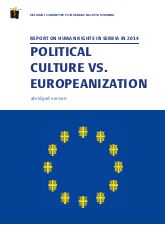
Keywords: Serbia; government; civil sector; human rights; elections; Russia; Kosovo; economy; media; security; international relations; Vojislav Šešelj;
Serbia is once again at crossroad that calls for the engagement of its entire society. The steps the government has made toward EU accession are insufficient, the more so since the government itself is not unanimous about the course. This is more than evident in the implementation of the Brussels Agreement. The great majority of citizens knows nothing or knows little about what a membership of EU implies. Besides, most major national institutions such as Serb Orthodox Church, parts of the Serbian Academy of Arts and Sciences (now trying to change its course), influential intellectuals and parts of the civil sector are not committed to the values on which EU rests. Turbulence within EU itself and disorientation of some member-states play into the hands of EU opponents and fuel their resistance. Human rights and freedoms have regressed considerably over the past three years, the backsliding itself escalating during the state of emergency declared because of floods (May 15-23, 2014) and in the aftermath. Requiring expertise and, above all, preventive measures, the crisis situation itself revealed the government’s weaknesses and its attitude toward key issues of further democratization.
More...
Keywords: Serbia; nationalism; human rights; politics; democracy; 2002; omnibus law; government; Hague Tribunal; federal law; Vojvodina; human rights; minority groups;
The year 2002 is regarded by many as a year lost because nearly all of the political capital gained on 5 October 2000 was squandered: the coalition which had brought about the downfall of Slobodan Milošević bogged down in futile infighting and was becoming its own chief obstacle. Having been established for the specific purpose of ousting Milošević, the Democratic Opposition of Serbia (DOS) nevertheless went on to shoulder the formidable task of transition, a burden its heterogeneous political makeup proved ill-equipped to bear. For all the enthusiasm which characterized the political situation in 2001, it became clear that the prevailing concept of democracy as a multi-party system devoid of proper institutions and the rule of law alone could not change the general political atmosphere in the country weighed down by the Milošević legacy, institutions mired in old attitudes and methods, and resistance to reform. The Federal Republic of Yugoslavia – now Serbia and Montenegro – was not admitted to the Council of Europe, nor did the DOS leaders’ promises of an association agreement with the EU materialize. Consequently, there was no appreciable headway in the domain of human rights.
More...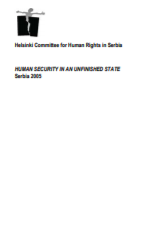
Keywords: Serbia; human security; human rights; nationalism; war crime trials; legislation; prison monitoring; cultural policy; media; education; Serbian Orthodox Church; Vojvodina; Sandžak; international relations;
Political, social and economic problems characteristic of the societies with strong national feelings and plagued by xenophobia and unsolved problems of the past kept weighting the overall situation of human rights in Serbia in 2005. The restoration of basic tenets of Milosevic’s policy (nationalism, populism, fundamental misconception of the international order and reality, resistance to change, marginalization of political opponents and their stigmatization, etc.) and the silent rehabilitation of the Socialists’ cadres (to be ascribed to the Socialist Party of Serbia’s support to the minority government, but shared ideological and other interests as well) called into question, i.e. brought to a standstill reforms and the process of facing up the past. Besides, Serbia is burdened with the defeated national policy and pending state issues. Serbia is still left without a new constitution that would define her as a modern state, and, consequently, without state symbols such as national anthem, banner, etc.
More...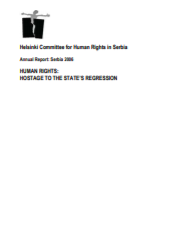
Keywords: Serbia; human rights; political regime; media; culture; Đinđić's assassination; parliamentary elections; security; police reform; Serbian Orthodox Church; economy; healthcare; education; minority; foreign policy;
With Montenegro’s successful referendum on independence and the resolution of Kosovo status on the international agenda in 2006 the process of ex-Yugoslavia’s dissolution moved into the final stage. Serbia was faced with the challenge of constituting and defining herself in terms of state and society. The very fact that the process of ex-Yugoslavia’s disintegration nears its end contributes to consolidation and stability of the Balkans. The decision to admit Serbia – her fluid domestic situation and hesitation to decisively opt for Europe - into the membership of the PfP was meant to round off the security structure of the Balkan region. 1 Membership of the PfP moved Serbia closer to the European option but also implied establishment of mechanisms that could play important role in the event of her destabilization. At the same time, the membership of the PfP figured as a victory over the army’s conservative bloc that has not only stood in the way of its reform but also obstructed the army’s adjustment to new circumstances and the new concept of security under the pretext of defending the state’s sovereignty. Gen. Zdravko Ponos’ appointment the Chief of General Staff completed the package recommending Serbia for speedier access to European integrations. However, the strong lobby that will be refuting and slowing down such orientation is still there.
More...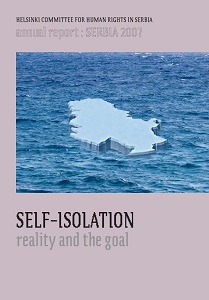
Keywords: elite; nationalism; socio-economy; army; security service; religion; constitutional and legal framework; Vojvodina; Sandžak; education; media; minority; Hague Tribunal; foreign policy;
The international community’s intervention put an end to two decades of massive violation of human rights (genocide, war crimes, persecution, torture, etc.) in the Balkans. The international community also set up the International Criminal Tribunal for the Former Yugoslavia to impose non-impunity and justice. Unfortunately, the end of massive and brutal violation of human rights did not result in adequate punishment of crimes. The process of establishment of a legal frame that would incorporate relevant international human rights documents is slow-paced and meets a number of obstacles – from both local and international players. Almost ten years after the intervention, it is still disputable whether the endeavor to protect human rights has actually promoted the human rights concept as imperative for a modern, democracy-oriented society. Serbia’s experience – but also that of neighboring countries – clearly indicates that such an ambitious plan necessitates decades of commitment. Some progress has been made in Serbia that – under the pressure from the international community but also from domestic actors – had to sign all relevant international conventions and regulate the domain of human rights under the Constitution and a number of laws.
More...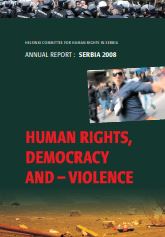
Keywords: Serbia; xenophobia; racism; intolerance; army; police; freedom of religion; legal system; socio-economic research; Vojvodina; Sandžak; national minority; media; international relations; human rights;
The trend of institutional disintegration continued in 2008 in parallel with economic standstill, all of which negatively affected citizens’ mood. The pro-European coalition that won the spring 2008 election failed to meet their expectations as it was not politically courageous enough to make a breakthrough in fundamental reforms. In the meantime Serbia, like all other countries in the region, entered recession. The global economic crisis will only aggravate Serbia’s recession caused by domestic crisis. Eight years after Milošević’s ouster it turned out that Serbia had failed to get transformed – for, its elites have basically remained the same and it has not distanced itself from Milošević’s program. The national program has not been defeated yet: its ideology still enjoys strong support from a part of the Serb elite. This is about the elite that had inspired the Memorandum of the Serb Academy of Arts and Sciences and created the program itself. The ICTY has never examined the part academicians, the Serb Orthodox Church, the Writers’ Association, journalists and cultural elite from this circle played in the Greater Serbia project. Their role has not been morally condemned either in Serbia or beyond it. So their activity in the post-Milošević era remained the same. They are still dictating a cultural matrix and “moral” values for the society as a whole. And this is what mainly obstructs establishment of a moral vertical without which the Serbian society can hardly recuperate. In addition, territorial aspirations are still present, which is best mirrored in the case of Bosnia-Herzegovina, i.e. Republika Srpska.
More...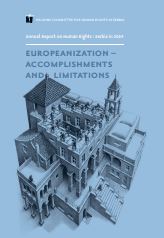
Keywords: European integration; violence; politics; army; police; legal system; Parliament; religion; Hague Tribunal; democracy; minority; Vojvodina; Sandžak; socio-economy; media; international relations;
In 2009, Serbia made necessary progress in defining its future as a European country. The measures taken by the Serbian Government in that direction opened its European perspective. This inevitably provoked adverse reactions by one part of the Serbian elite, which is feverishly defending its position and insisting on the greater-state national project. This specifically refers to its resistance to NATO membership, interpretation of the recent past and defense of Bosnia’s status quo. Regardless of the opening of its European perspective, Serbia is still torn between its wish to join the European family and a strong conservative bloc trying to preserve the model of a patriarchal and populist state. The aggravating factors are a total blockade of the economy, bad privatization, monopolistic status of tycoons and incapable leaders at all levels. A drag on development is also centralism that stubbornly resists any decentralization and regionalization, which are a prerequisite for democratization and the undertaking of responsibility at all levels. Serbia’s progress toward the European perspective also implies a more resolute internal transformation, involving the status of Vojvodina, change of the Constitution, decentralization and regionalization, status of minorities and reform of the country’s media space. This is a prerequisite for breaking away from Milošević’s legacy.
More...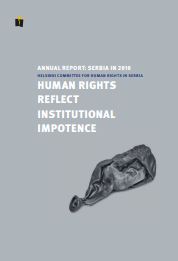
Keywords: nationalism; Europeanization; Serbia; judicial reform; army; police; security service; Parliament; independent agency; legal regulations; religion; economy; media; discrimination; international relations;
The unexpectedly long economic crisis has exposed all the weaknesses – political, economic and social – of the present system, which has not yet made a fundamental break with the legacy of the Milošević regime. The blind alley in which Serbia has found itself again gives rise to serious concern because its democratic achievements, albeit minimal, and its progress towards EU membership are both in question. At 58%, popular support for EU integration is lowest so far. This is largely due to the fact that citizens’ concrete interests are excluded from the authorities’ communication with the public concerning the accession process, as well as to the fact that the process itself has been reduced to a vague state- bureaucratic procedure taking place beyond the reach of the citizens and not taking account of their interests. The process of European integration has been systematically reduced to formal questions concerning legislation, procedure and bureaucratic conditionality. The process is presented to the public in such a way as to show no connection with individuals’ concrete interests.
More...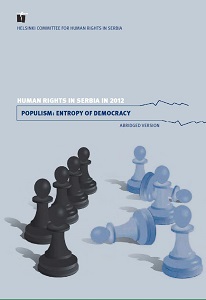
Keywords: Serbia; judiciary; nationalism; Parliament; army; police; security; regulatory agency; minority; religion; socio-economy; prison system; media; Vojvodina; Sandžak;
EU strategic decision on Serbia’s candidacy is crucial for the country’s further movement towards European integrations. Had it not been for it, Serbia’s poor democratic potential would have been trapped by its strong, populist right-wing. The Serbian society is still incapable to definitely opt for a substantive, democratic transformation and fulfillment of the Copenhagen criteria. Regardless of all the pressures to which it has probably been exposed, the political pivot’s, the Democratic Party’s, failure to progress more towards Europeanization testifies of its lack of states manly leadership and inability for a political U-turn. Having radicalized the Kosovo issue Belgrade has undermined its standing in EU. Mainstream political and intellectual elites do not look to the future. Serbia needs to take stock of its situation. The society’s un-readiness to cope with the past plays into the hands of the political right and its attempts at blocking Serbia’s Euro-Atlantic integration. Rather than accept the reality, the political elite is autistic and trapped by self-pity. As long as its elite role-plays a victim Serbia will not be able to work constructively on its future and the future of the region.
More...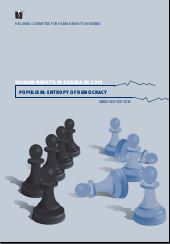
Keywords: Serbia; human rights; populism; judiciary; military; security system; Serbia's assembly; economy; religion; ethnic minorities; media; Kosovo; international relations;
Though formed a year ago, the Serbian government is still at the beginning – it has not yet adopted a systemic program or strategy. The structures in power are in permanent election campaign having an eye on their ratings on the one hand and demonization of the former government on the other. The biggest party of the ruling coalition, SNS, spares not even its coalition partners from criticism. SNS populist rhetoric is mainly after promoting Vice-Premier Aleksandar Vučić. The predominant populism is best exemplified by the arrest of suspects in “the struggle against corruption” and the “socially-oriented” budget for the year 2013 that subsidizes health insurance of a larger circle of citizens. All this gives rise to speculations about early elections, which are not to be ruled out. Aleksandar Vučić manifests a growing ambition to hold all the reins of power. He already controls all security services. Hence, citizens are under the impression that he is the most powerful man in Serbia. The steps the government has taken so far do not indicate its intention to reform the security sector; on the contrary, they indicate an ambition to strengthen partisan control over it. They neither indicate a plan for setting up permanent anti-corruption institutions and mechanisms. Primarily through the media controlled by parts or entire security services corruption is used for political showdowns and elimination of business competition. The security sector that has not undergone reform, operating under half-finished and legally discordant system of the democratic control and with cadres compromised on corruption will be unable to meet ambitious duties that have been allegedly imposed on it.
More...